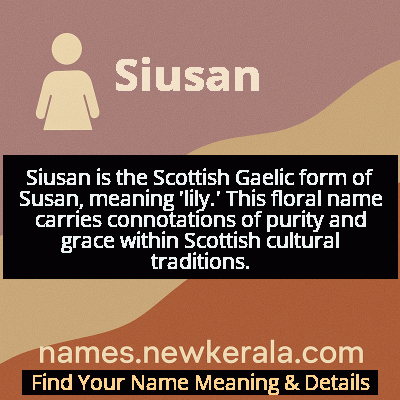Siusan Name Meaning & Details
Origin, Popularity, Numerology Analysis & Name Meaning of Siusan
Discover the origin, meaning, and cultural significance of the name SIUSAN. Delve into its historical roots and explore the lasting impact it has had on communities and traditions.
Name
Siusan
Gender
Female
Origin
Scottish
Lucky Number
2
Meaning of the Name - Siusan
Siusan is the Scottish Gaelic form of Susan, meaning 'lily.' This floral name carries connotations of purity and grace within Scottish cultural traditions.
Siusan - Complete Numerology Analysis
Your Numerology Number
Based on Pythagorean Numerology System
Ruling Planet
Moon
Positive Nature
Diplomatic, friendly, artistic, empathetic.
Negative Traits
Over-sensitive, moody, indecisive, prone to self-pity.
Lucky Colours
Green, cream, white.
Lucky Days
Monday.
Lucky Stones
Pearl, moonstone.
Harmony Numbers
1, 3, 4.
Best Suited Professions
Diplomats, mediators, caregivers, artists.
What People Like About You
Cooperative spirit, friendliness, artistic talent.
Famous People Named Siusan
Siusan O'Rourke
Traditional Singer
Preserver and performer of Scottish Gaelic folk music
Siusan MacLeod
Poet
Noted for Gaelic poetry collections celebrating Highland culture
Siusan Patterson
Cultural Historian
Author of works on Scottish naming traditions and clan histories
Name Variations & International Equivalents
Click on blue names to explore their detailed meanings. Gray names with will be available soon.
Cultural & Historical Significance
Throughout Scottish history, Siusan has been particularly associated with the Western Isles and Highlands, where Gaelic naming traditions remained strongest. The name embodies the resilience of Scottish culture during periods of political and social change, serving as a linguistic bridge between ancient Celtic traditions and broader European Christian influences. Its continued use represents a conscious choice to honor Scottish heritage while maintaining connections to universal Christian symbolism.
Extended Personality Analysis
Women named Siusan are often perceived as possessing a quiet strength and deep-rooted resilience, reflecting the historical endurance of Scottish culture. They typically demonstrate a balance of traditional values with independent thinking, showing both reverence for heritage and adaptability to modern circumstances. This combination often makes them excellent custodians of family traditions while being forward-thinking in their personal and professional lives.
Common traits include strong intuition, artistic sensibility, and a natural grace that aligns with the name's floral meaning. Siusans are frequently described as having a calming presence and diplomatic nature, able to bridge different perspectives while maintaining their core identity. Their personality often reflects the Scottish characteristic of 'couthiness' - a blend of warmth, practicality, and genuine connection with others that creates lasting relationships and community respect.
Modern Usage & Popularity
In contemporary times, Siusan remains a relatively rare but cherished name, primarily used in Scotland and among Scottish diaspora communities seeking to preserve Gaelic heritage. While not appearing on mainstream popularity charts, it enjoys steady usage among families with strong Scottish connections, particularly in the Highlands and Islands. The name has seen a modest revival in recent decades as part of the broader Gaelic renaissance movement, with parents choosing it to honor ancestral roots and support linguistic preservation. Its usage reflects a conscious cultural choice rather than following naming trends, maintaining its status as a distinctive marker of Scottish identity.
Symbolic & Spiritual Meanings
Symbolically, Siusan carries multiple layers of meaning that extend beyond its literal translation as 'lily.' The lily itself represents purity, renewal, and grace in Christian symbolism, while in Celtic traditions, flowers often symbolize the connection between nature and spiritual realms. The name embodies the resilience of Scottish culture, serving as a living link to Gaelic linguistic heritage and the preservation of identity through naming practices. It also represents the blending of traditions - the integration of Christian influences into native Celtic culture, creating something uniquely Scottish that honors both roots and adaptation.

